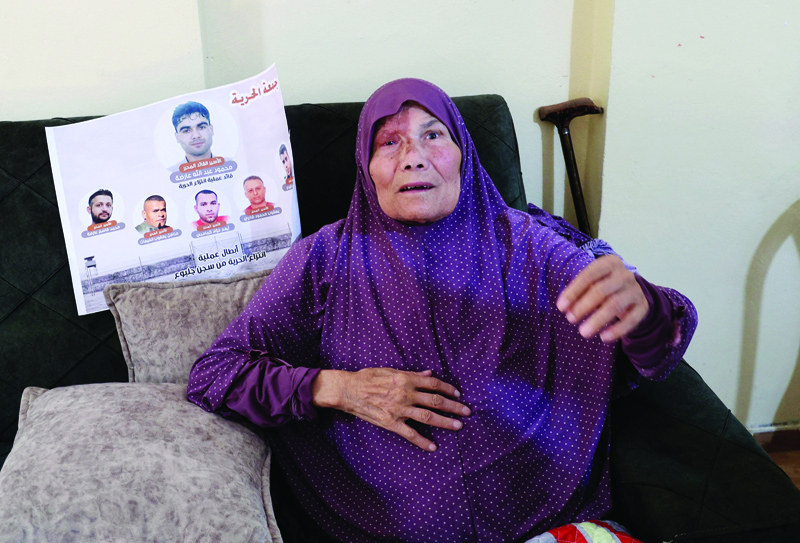 ARABAH: Fathiya Al-Ardah, mother of escaped Palestinian prisoner Mahmud Al-Ardah, speaks at their home in this village near Jenin on Sept 12, 2021 after her son's arrest by Zionist authorities. – AFP
ARABAH: Fathiya Al-Ardah, mother of escaped Palestinian prisoner Mahmud Al-Ardah, speaks at their home in this village near Jenin on Sept 12, 2021 after her son's arrest by Zionist authorities. – AFP
JENIN: Four of the six Palestinians who staged a Hollywood-style escape from a Zionist prison may be back behind bars, but in their hometown they are being celebrated as heroes. When cellphones buzzed last week in Jenin with news of the spectacular jailbreak from a high-security prison, Abu Antoine dreamt his nephew Zakaria Zubeidi might never be caught. "In the hour after the announcement, we were filled with hope," Abu Antoine told AFP. "We said to ourselves: 'If he hasn't been arrested yet, maybe he'll be free forever'."
Zubeidi, 46, was the most prominent of the six who had dug a tunnel underneath a sink and made their way to freedom, embarrassing their captors and sparking a massive manhunt. Jenin in the occupied West Bank is a historic flashpoint in the Zionist-Palestinian conflict, and Zubeidi is one of the city's most famous sons. During the second intifada, or uprising, of 2000-2005 he was the local leader of the Al-Aqsa Martyrs' Brigade, the armed wing of Palestinian president Mahmud Abbas's Fatah faction.
He has since run afoul of both Zionist and Palestinian authorities and, after agreeing to lay down his arms more than a decade ago, also dabbled in theatre. He was arrested by the Zionist entity in 2019 and was serving time in Gilboa prison, along with the other five escapees, all members of the group Islamic Jihad. The jailbreak marked a high-profile embarrassment for the Zionist entity's vaunted security establishment.
In Palestinian areas, it sparked joy, with supporters handing out sweets in celebration. There was feverish speculation the six may have escaped to neighboring Jordan or Syria. Jenin's resistance iconography was also freshened up, with new posters of the fugitives plastered on concrete walls beside the torn and fading images of the "martyrs" of the intifada.
But on Friday night, two of the six escapees were re-arrested by Zionist security forces, in the majority Arab city of Nazareth. The next morning, Zubeidi and another fugitive were also picked up, at a lorry park outside Nazareth. Two members of the group remain at large. All six of the escapees have been implicated in planning or perpetrating attacks on Zionists, and news of the re-arrests was welcomed across the Zionist entity.
Abu Antoine said the "escape remains a victory for Palestinians" but conceded the re-captures had made that victory "incomplete". He recalled that Zubeidi's grandfather had escaped in the summer of 1958 from the Zionist entity's since-closed Shata prison. Palestinian newspaper clippings from the time, shared this week on messaging apps, noted the "glory" the escape had brought to the family.
A fresh Palestinian effort was underway to bolster the heroic status of the latest jailbreakers. Shortly after the Zionist entity released photos of Zubeidi following his rearrest, handcuffed and appearing forlorn, a doctored image began circulating on Palestinian social media accounts showing him smiling. Falestine al-Youm (Palestine Today), the television voice of Islamic Jihad, has broadcast tributes to its escapees, highlighting its member Mahmud Abdullah Al-Ardah, 45, who spent 25 years in prison and is considered the mastermind of the jailbreak.
A giant poster of Ardah adorns his family home in the village of Arraba, just outside Jenin. Wearing a white-dotted hijab, Ardah's mother Fatiha was glued to the rolling TV tributes. "When he was released, I was dancing with joy," she told AFP. "I hoped the door of our house would open and he would be there." Ardah's brother Mohammed told AFP he was contacted by a Zionist intelligence officer while his brother was on the run.
"He said to me: 'If Mahmud comes home, let him kiss his mother then call us and we'll arrest him'. I told him 'no, I will not call you,'", Mohammed recounted, although that moment never came. Ardah was arrested in Nazareth, without putting up resistance, after being pursued by a Zionist helicopter. "I couldn't believe it," Mohammed said. "But I thought, 'at least he is still alive'. And I realized that for him five days of freedom are the equivalent of 50 years." - AFP




